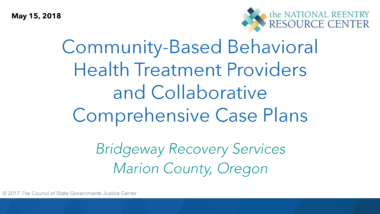How Community-Based Behavioral Health Treatment Providers Can Develop and Implement Collaborative Comprehensive Case Plans
Hosted by the National Reentry Resource Center with funding support from the U.S. Department of Justice’s Bureau of Justice Assistance
Many programs struggle to develop and maintain case plans that help their participants reduce their risk for recidivating and advance their goals for recovery. To address this, the Collaborative Comprehensive Case Plans: Addressing Criminogenic Risk and Behavioral Health Needs website was developed to provide tools and resources that can help criminal justice and behavioral health professionals better integrate critical behavioral health and criminogenic risk and needs information into collaborative comprehensive case plans that actively engage the participant and reflect interagency collaboration. The National Reentry Resource Center hosted a series of webinars that discuss how corrections and behavioral health professionals can use this web-based tool, as well as highlight what it looks like when different types agencies are the lead case planners that oversee the case planning process.
This webinar focusses on a community-based behavioral health treatment provider as the lead case planner. The webinar features the reentry programs of Bridgeway Recovery Services in Salem, Oregon, by providing a conceptual overview of the Bridgeway programming and discussing the program’s processes in three key areas: (1) interagency collaboration and information sharing; (2) staff training; and (3) screening and assessment as part of their collaborative comprehensive case plan process.
Speakers
- Andre Bethea, Policy Advisor for Corrections, Bureau of Justice Assistance, US Department of Justice
- Tina Bialas, Director of Behavioral Health Services, Bridgeway Recovery Services
- Allison Upton, Senior Policy Analyst, The Council of State Governments Justice Center
Find other events
You might also be interested in
Almost half of all violent crime in Kentucky is rooted in domestic violence (DV), and nearly 40 percent…
Read MoreArkansas policymakers have long expressed concerns about the state’s high recidivism rate. Over the past 10 years, an…
Read MoreGovernors emphasized a wide range of criminal justice and behavioral health initiatives in this year’s state-of-the-state addresses. From…
Read More Key Findings and Recommendations from Kentucky’s Justice Reinvestment Initiative to Better Understand and Address Domestic Violence
Read More
Key Findings and Recommendations from Kentucky’s Justice Reinvestment Initiative to Better Understand and Address Domestic Violence
Read More
 Apply Now for Resident Analyst Program to Increase Data Analysis Capacity at Departments of Corrections
Read More
Apply Now for Resident Analyst Program to Increase Data Analysis Capacity at Departments of Corrections
Read More


















